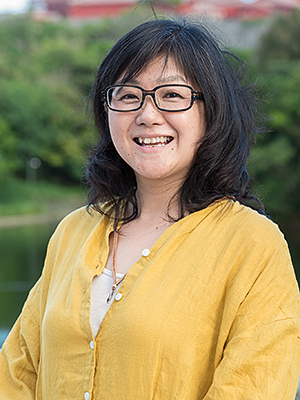CASE 09「Fukushima Hinansha no Tsudoi Okinawa Jangara-Kai(Okinawa)」
Interview 01 - Ms. Noa Sakurai, Representative of Fukushima Hinansha no Tsudoi Okinawa Jangara-Kai
 Q1.Tell us about what made you decide to do support work.
Q1.Tell us about what made you decide to do support work.
A.When my family and I evacuated to Okinawa from Koriyama, Fukushima, it was right after the earthquake, and there weren't many services or information available yet. I thought that we were the only evacuees in the area. But a kind Okinawan person arranged a hotel for us, and when we went there, we met other people who had evacuated from Fukushima. That was when I learned we weren't the only ones.
I listened to evacuees who had evacuated to Okinawa, just like us, and struggled because they didn't have connections to anyone. I had done volunteer work before in Fukushima, and I felt that I wanted to do what I could. At first, I called evacuees through an association for people from Fukushima in Okinawa, and we talked, networked, and shared our feelings. I spoke with a lot of people, and many of them were hurting. I wanted to help them in any way I could, and that's why I started doing support work.
Q2.Please tell us about the HIRAETH Project Team.
A.At first, I did support work while working full-time.
Initially, there wasn't a lot of information out there, and I was at a loss for what to do. There was a lot to think over. I felt that, since I was there at the time of the disaster, I have to work hard and help us rebuild. I thought, "We all have to work hard." Those thoughts took precedent in my mind. I feel that I haven't been able to support each one of the people in positions of less power and people who weren't in places, emotionally, where they could work hard. I regret that.
Still, I wanted to help the people who were isolated and struggling in the places where they had evacuated to, and I wanted to create a place where anyone could feel comfortable visiting. As I continued these activities, I met a lot of people, learned through them, and talked to them, and the problem began to be solved, little by little.
I'm a disaster survivor as well as an advocate, and there were times when I felt burdened.
It was actually very difficult for an evacuee to become an advocate. But I learned that there are people all over the country who, just like me, are survivors and are working hard every day. I was able to talk with them and we shared the same feelings.
As I connected with everyone, I started to see what needed to be done. I thought, "We have to share our experiences and feelings and get them out there," and I formed the HIRAETH Project Team.
Q3.What do your prioritize in your support work?
A.My fellow survivors and advocates come first. You can't do anything just worrying and deliberating on your own. The solutions to problems become clear precisely because of your connections with other people. If you have colleagues and allies who really understand your feelings, you'll be able to see the answers to the problems you were dealing with on your own.
Then, you have to do the things you're genuinely feeling, the things that need to be done, and do them the right way. It doesn't have to be something big. It just comes from the feeling of wanting the people around you to be happy. What do they need? If you do what needs to be done, and do it right, that will be a great asset.
Precisely because I am a survivor, a person in the same position as all the other evacuees who can empathize with them, I want to keep doing support work that genuinely comforts them.
※Please Contact below email for any Inquiry.
<NPO Medical Network Aid Center>
Email : contact@medical-bank.org
